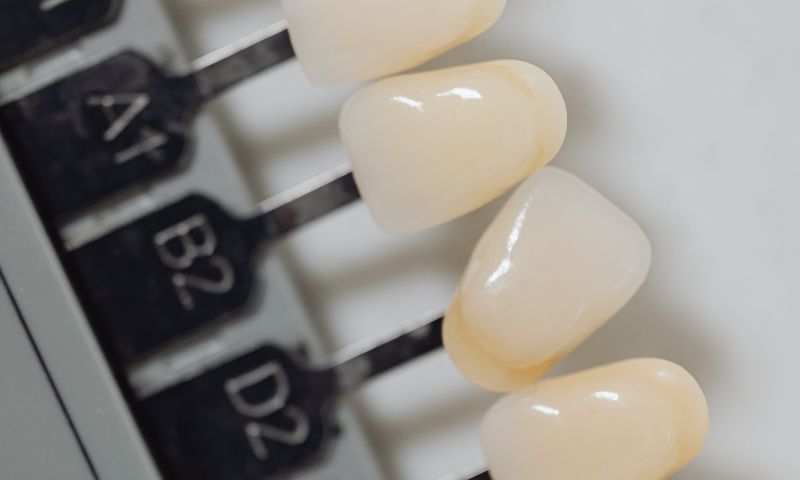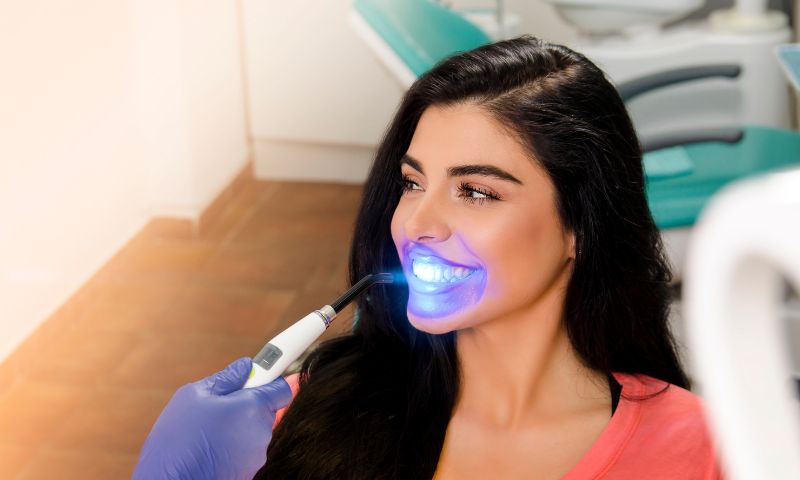Teeth Whitening



Teeth whitening is a popular cosmetic treatment that helps improve the appearance of teeth by removing stains and discoloration caused by aging, food, and beverages such as coffee and tobacco. Various options are available, from in-office treatments to at-home products, allowing people to achieve a whiter, more radiant smile quickly and effectively.
Teeth whitening methods:

Teeth whitening is a popular procedure to enhance the aesthetics of the smile, used to lighten stained or yellowed teeth. There are several teeth whitening methods, which are mainly divided into two categories: those performed in dental offices and those done at home.
In-office whitening is carried out by a professional and uses products with higher concentrations than those available for home use. This procedure may include the use of whitening gels containing hydrogen peroxide or carbamide peroxide, which are applied directly to the teeth. In some cases, a special light or laser is used to activate the gel and speed up the process. In-office whitening provides quick and visible results in a single session, making it ideal for people who seek immediate results.
On the other hand, at-home teeth whitening is done using products like whitening toothpaste, whitening strips, or gels applied with custom trays. These products contain a lower concentration of peroxide, so the results usually take longer to appear, but they can still be effective if the dentist’s instructions are followed. Custom trays allow the gel to adhere better to the teeth and distribute more evenly, ensuring a more uniform whitening.
Additionally, there are natural teeth whitening methods, although these are less effective and not as supported by scientific evidence. The use of baking soda, coconut oil, or apple cider vinegar are some of the most common home remedies. However, these methods may not be safe if used incorrectly and do not provide as noticeable results as professional procedures.
It is important to consult with a dentist before undergoing a teeth whitening treatment to evaluate overall dental health, as certain issues, such as cavities or sensitive gums, can interfere with the results or worsen the condition of the teeth.
Safety and side effects:

Teeth whitening is a popular cosmetic treatment aimed at improving the appearance of teeth by making them whiter and brighter. Although it is generally a safe procedure when performed under the supervision of professionals, it is important to consider certain safety aspects and potential side effects.
In terms of safety, teeth whitening performed in dental offices or with products approved by organizations such as the FDA (U.S. Food and Drug Administration) is generally safe. Dentists conduct a thorough evaluation of the patient’s oral health before starting the treatment, ensuring that there are no underlying issues such as cavities, gum disease, or sensitive teeth that could complicate the procedure. Additionally, using products with the appropriate concentration of hydrogen peroxide or carbamide peroxide is key to preventing damage.
However, although teeth whitening is effective and safe for most people, some temporary side effects may occur. The most common is dental sensitivity. Some people experience sensitivity in their teeth during or after the treatment, which can cause discomfort when consuming hot or cold foods. This side effect generally disappears after a short period once the treatment is stopped.
Another possible side effect is gum irritation. If the whitening gel comes into contact with the soft tissues of the mouth, it can cause temporary redness or swelling. To minimize this risk, dentists apply gum protectors or use specific techniques to prevent direct contact.
It is essential to follow the dentist’s instructions and not exceed the recommended treatment time. Otherwise, excessive whitening could damage tooth enamel. In general, with proper monitoring, teeth whitening is a safe and effective option for those looking to enhance their smile.
Results and duration:

Teeth whitening is a very popular cosmetic option for achieving a whiter and brighter smile. The results of this treatment can be notably effective, but its duration depends on several factors, such as the type of treatment chosen, the patient’s habits, and post-treatment care.
In general, the results of teeth whitening are visible immediately after the first session, especially in procedures performed by professionals in dental clinics. Teeth can become several shades whiter, depending on the degree of original discoloration. At-home treatments, although effective as well, may take longer to show results because they use lower concentrations of whitening agents.
The duration of teeth whitening effects varies according to each person’s lifestyle. Factors such as frequent consumption of foods or beverages that stain teeth, like coffee, tea, red wine, and tobacco, can cause the teeth to darken again more quickly. For those who follow a more careful diet and maintain good oral hygiene habits, the results can last between six months and two years.
It is important to highlight that teeth whitening is not a permanent treatment. Although the effects are long-lasting, over time, maintenance sessions may be needed to preserve the brightness of the teeth. Additionally, dental sensitivity may be a temporary side effect during or after the treatment, although it typically disappears quickly.
To maximize the results and duration of whitening, it is crucial to follow the dentist’s recommendations, such as avoiding foods and drinks that may stain teeth and maintaining a proper dental care routine, including brushing and flossing.
Benefits of Teeth Whitening:
Teeth whitening improves the appearance of your smile by removing stains and discoloration. It provides whiter, brighter teeth, boosting confidence and self-esteem. It is a fast, safe, and noninvasive treatment, ideal for those seeking immediate aesthetic results.

- Removes stains and tooth discoloration.
- Improves the aesthetics and appearance of the smile.
- It is a fast and effective treatment.
- Increases confidence and self-esteem.
- Safe and minimally invasive procedure.
Is teeth whitening safe for everyone?
In general, teeth whitening is safe for most people, but it’s not suitable for everyone. People with inflamed gums, extremely sensitive teeth, or dental problems such as untreated cavities or periodontal disease should address these issues before undergoing whitening. Additionally, pregnant or breastfeeding women often avoid whitening, as there is insufficient research on the potential effects in these cases. It’s important to undergo a full evaluation before proceeding.
Which whitening method is most effective?
The most effective method depends on individual needs. In-office whitening, performed by a dentist, is usually faster and more effective, as it uses more concentrated products and may include light or lasers to enhance the results. Home whitening kits are gentler, require more time to achieve the same level of whiteness, and can be less expensive, but are generally suitable for people with superficial stains. The choice depends on the condition of your teeth and your expectations.
How long do teeth whitening results last?
The duration of results varies from person to person, but generally, the effects of whitening can last between 6 months and 2 years. This depends on your habits, such as the consumption of foods or beverages that can stain teeth (coffee, red wine, tobacco). To prolong the results, I recommend maintaining excellent dental hygiene and avoiding these factors that can exacerbate stains. Some patients opt for periodic touch-ups every few months to maintain their whiteness.
Does teeth whitening cause sensitivity?
It’s common to experience some temporary tooth sensitivity during or after a whitening treatment, especially with stronger methods. However, this sensitivity is usually temporary and disappears within a few days after the treatment ends. If sensitivity is a recurring problem, there are specific toothpastes for sensitive teeth, or we can adjust the treatment to minimize this effect.
Can I get teeth whitening if I have fillings or crowns?
Teeth whitening only affects natural tooth enamel, not materials such as fillings, crowns, or veneers. This means that if you have fillings or crowns on your visible teeth, your natural teeth may appear whiter than restorative work after whitening. If you plan to whiten your teeth, I would recommend discussing whether some of that work needs to be replaced after treatment so that all teeth have a uniform color.
We always take care of your smile.
614 415 8236 Call us and schedule your appointment

